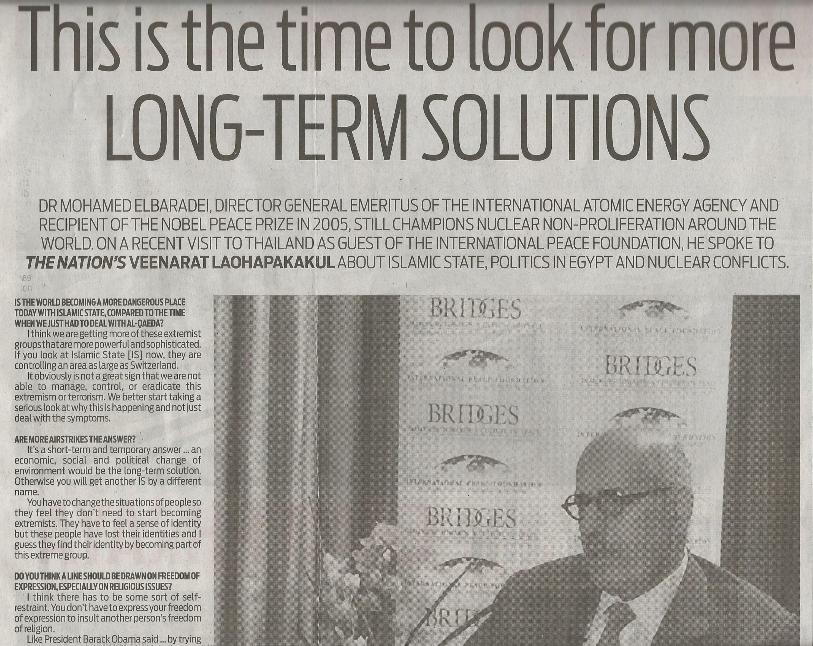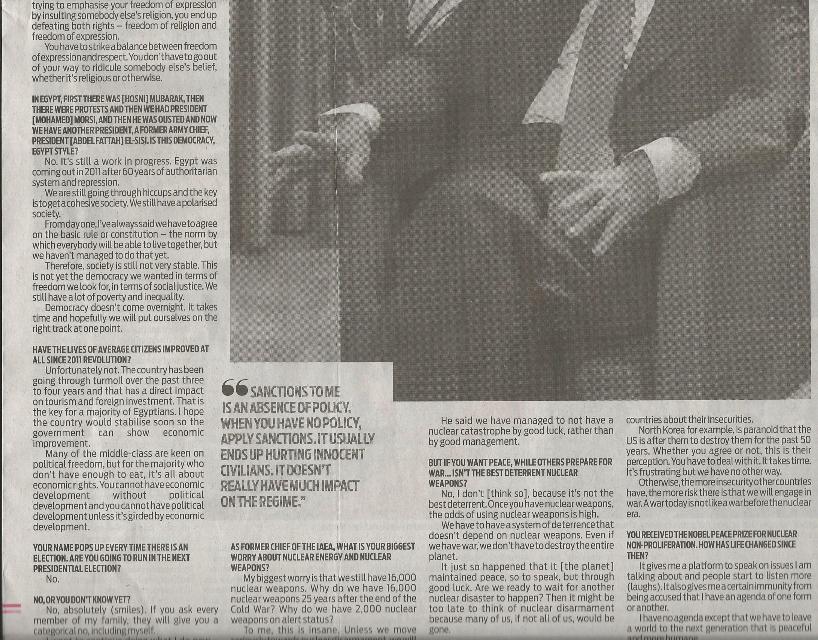|
| |
 |
|
This is the time to look for more long-term solutions
|
The Nation
22 February 2015
http://www.nationmultimedia.com/opinion/This-is-the-time-to-look-for-more-long-term-soluti-30254615.html



Dr Mohamed ElBaradei, Director General Emeritus of the International Atomic Energy Agency and recipient of the Nobel Peace Prize in 2005, still champions nuclear non-proliferation around the world. On a recent visit to Thailand as guest of the International Peace Foundation, he spoke to the Nation's Veenarat Laohapakakul about Islamic State, politics in egypt and nuclear conflicts.
Is the world becoming a more dangerous place today with Islamic State, compared to the time when we just had to deal with al-qaeda?
I think we are getting more of these extremist groups that are more powerful and sophisticated. If you look at Islamic State [IS] now, they are controlling an area as large as Switzerland.
It obviously is not a great sign that we are not able to manage, control, or eradicate this extremism or terrorism. We better start taking a serious look at why this is happening and not just deal with the symptoms.
Are more airstrikes the answer?
It's a short-term and temporary answer ... an economic, social and political change of environment would be the long-term solution. Otherwise you will get another IS by a different name.
You have to change the situations of people so they feel they don't need to start becoming extremists. They have to feel a sense of identity but these people have lost their identities and I guess they find their identity by becoming part of this extreme group.
Do you think a line should be drawn on freedom of expression, especially on religious issues?
I think there has to be some sort of self-restraint. You don't have to express your freedom of expression to insult another person's freedom of religion.
Like President Barack Obama said ... by trying to do that you are defeating both rights. If you are trying to emphasise your freedom of expression by insulting somebody else's religion, you end up defeating both rights - freedom of religion and freedom of expression.
You have to strike a balance between freedom of expression and respect. You don't have to go out of your way to ridicule somebody else's belief, whether it's religious or otherwise.
In Egypt, first there was [Hosni] Mubarak, then there were protests and then we had President [Mohamed] Morsi, and then he was ousted and now we have another president, a former army chief, President [Abdel Fattah] el-Sisi. Is this democracy, Egypt style?
No. It's still a work in progress. Egypt was coming out in 2011 after 60 years of authoritarian system and repression.
We are still going through hiccups and the key is to get a cohesive society. We still have a polarised society.
From day one, I've always said we have to agree on the basic rule or constitution - the norm by which everybody will be able to live together, but we haven't managed to do that yet.
Therefore, society is still not very stable. This is not yet the democracy we wanted in terms of freedom we look for, in terms of social justice. We still have a lot of poverty and inequality.
Democracy doesn't come overnight. It takes time and hopefully we will put ourselves on the right track at one point.
Have the lives of average citizens improved at all since 2011 revolution?
Unfortunately not. The country has been going through turmoil over the past three to four years and that has a direct impact on tourism and foreign investment. That is the key for a majority of Egyptians. I hope the country would stabilise soon so the government can show economic improvement.
Many of the middle-class are keen on political freedom, but for the majority who don't have enough to eat, it's all about economic rights. You cannot have economic development without political development and you cannot have political development unless it's girded by economic development.
Your name pops up every time there is an election. Are you going to run in the next presidential election?
No.
No, or you don't know yet?
No, absolutely (smiles). If you ask every member of my family, they will give you a categorical no, including myself.
I want to continue doing what I do now - providing advice, being a coach. I want to see an opportunity of change for the generation. We need the younger generation. We need the social-network generation to take over. They come up with different ideas and views. We have to give them a chance.
I strongly believe that part of our problem, not only in Egypt but in the Arab world, is that we have not empowered the younger generation enough.
As former chief of the IAEA, what is your biggest worry about nuclear energy and nuclear weapons?
My biggest worry is that we still have 16,000 nuclear weapons. Why do we have 16,000 nuclear weapons 25 years after the end of the Cold War? Why do we have 2,000 nuclear weapons on alert status?
To me, this is insane. Unless we move seriously towards nuclear disarmament, we will still have nuclear threat. It's not just Iran or North Korea. Any one of these can explode by miscalculation or computer error.
Recently I gave a lecture at Harvard [University], and Bill Perry, who was [US] secretary of Defence, said he knows of three cases of reported Soviet missiles screaming towards the US. Of course, they were a false alarm.
He said we have managed to not have a nuclear catastrophe by good luck, rather than by good management.
But if you want peace, while others prepare for war... isn't the best deterrent nuclear weapons?
No, I don't [think so], because it's not the best deterrent. Once you have nuclear weapons, the odds of using nuclear weapons is high.
We have to have a system of deterrence that doesn't depend on nuclear weapons. Even if we have war, we don't have to destroy the entire planet.
It just so happened that it [the planet] maintained peace, so to speak, but through good luck. Are we ready to wait for another nuclear disaster to happen? Then it might be too late to think of nuclear disarmament because many of us, if not all of us, would be gone.
Are negotiations and diplomacy the best option for talks with Iran and North Korea instead of sanctions?
Sanctions to me is an absence of policy. When you have no policy, apply sanctions. It usually ends up hurting innocent civilians. It doesn't really have much impact on the regime.
It's dialogue. It's building trust. You have to find a system by which to provide assurance to these countries about their insecurities.
North Korea for example, is paranoid that the US is after them to destroy them for the past 50 years. Whether you agree or not, this is their perception. You have to deal with it. It takes time. It's frustrating but we have no other way.
Otherwise, the more insecurity other countries have, the more risk there is that we will engage in war. A war today is not like a war before the nuclear era.
You received the Nobel Peace Prize for nuclear non-proliferation. How has life changed since then?
It gives me a platform to speak on issues I am talking about and people start to listen more (laughs). It also gives me a certain immunity from being accused that I have an agenda of one form or another.
I have no agenda except that we have to leave a world to the next generation that is peaceful and more humane.
Of course, you get a lot of requests to speak up and it's an additional strain on one's personal life, but it's something satisfying to feel that you are doing something that is good for humanity ... I hope.
|
|
|
